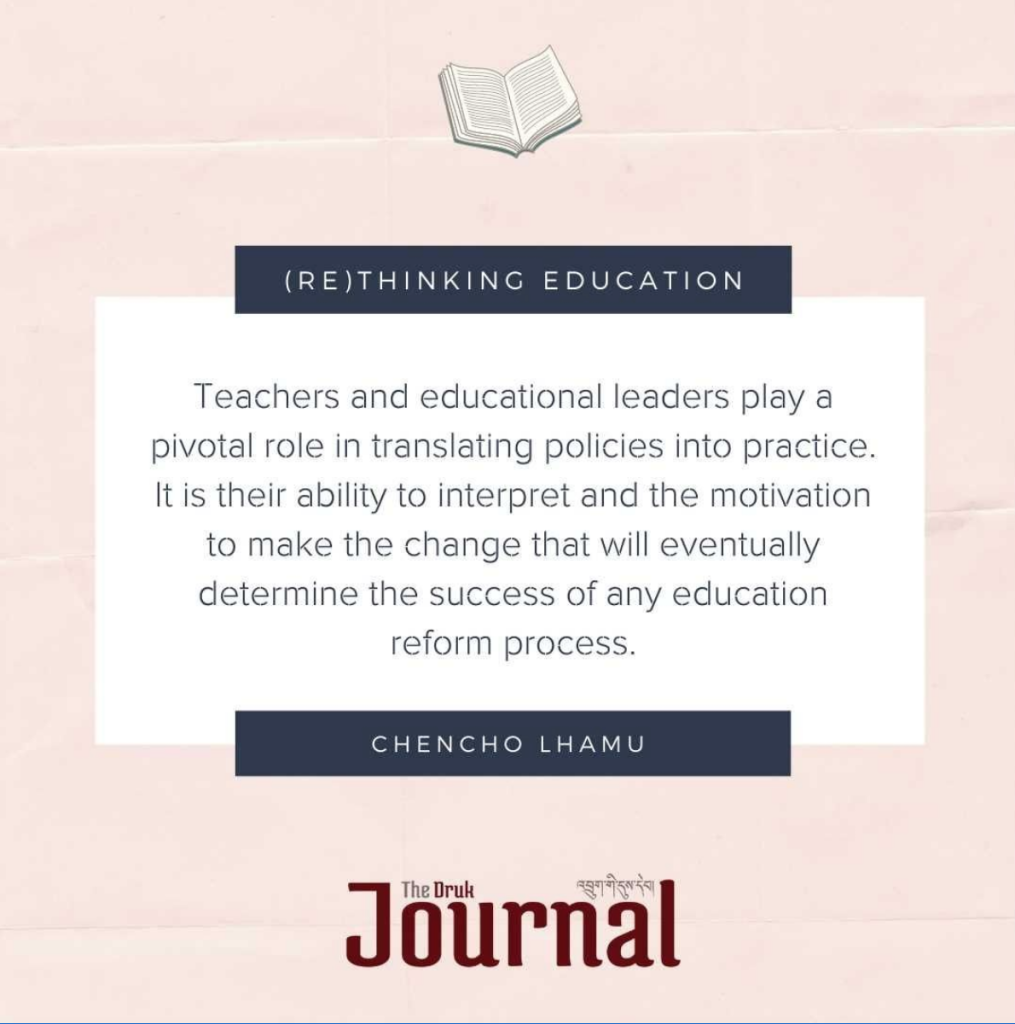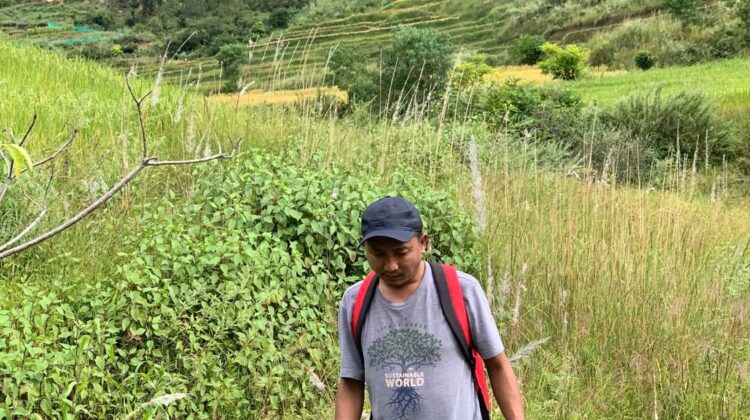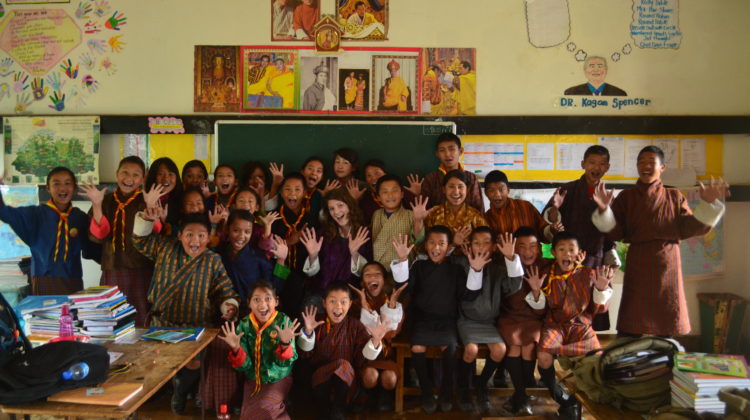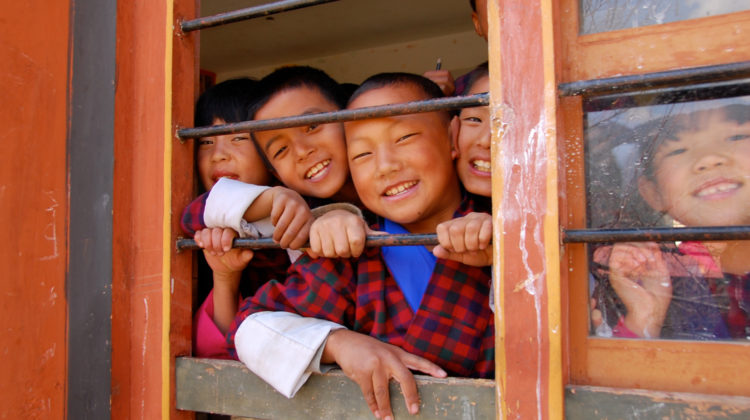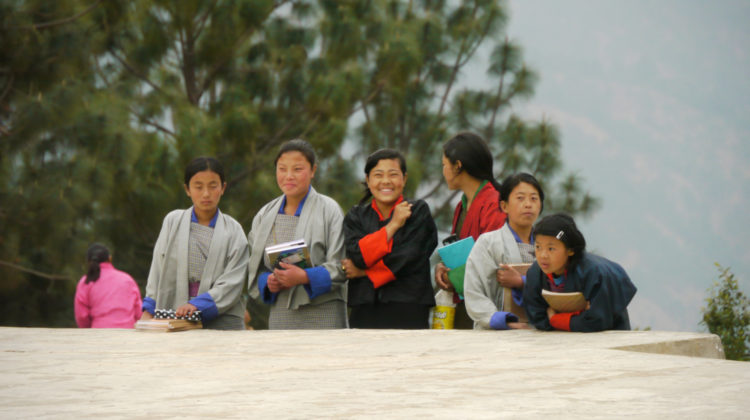* This Think Piece originally appeared as an article in The Druk Journal volume titled: Bhutan after the COVID-19 Crisis (Volume 7, Issue 1; Spring 2021). The original can be found here. BCF thanks The Druk Journal for its kind permission to post the article in our Think Piece series. The views expressed in the article are the author’s.
Author: Chencho Lhamu
The Journey Thus Far
The 2020 pandemic was a timely awakening from the slumber of malaise seeping into Bhutanese society. It amplified widening and deepening fault lines in the Bhutanese education system, after over six decades of modern education.
Bhutanese society has transformed socially, politically, economically and technologically since the beginning of modernisation in the early 1960s. The country successfully transitioned to a Democratic Constitutional Monarchy in 2008. Its education system progressed from an Indian curriculum to a contextualised one, an independent assessment and examination board and a national teaching force since the 1980s1 and the establishment of the Royal University of Bhutan in 2003.2
Access to education stands at a commendable gross enrolment rate of 108.8% at the primary level, 89.81% at the higher secondary school level, and 23.58% in the tertiary education level (inclusive of Bhutanese studying abroad).3 The burgeoning civil service manned by educated Bhutanese is a standing testament to how the education system has served thus far.
Bhutan’s economy evolved from subsistence farming to a more diversified one, with the tourism and hydro power industries driving the economy. With an annual growth of Gross Domestic Product (GDP) averaging 7.5% since the 1980s, Bhutan was one of the fastest growing economies in the region.4
However, as His Majesty the King has decreed, it is time for Bhutan not to seek comfort in past achievements or use old measuring yards to gauge current successes. It is time to envision an education system that is relevant to current times.5 In light of the Royal Decree to reform education, the following section summarises the changing milieu and symptoms of an ailing education system, to set the context for a renewed educational vision and practice.
The Impetus for Educational Reform
Having experienced the agricultural and the industrial revolutions that made distinct impacts on human culture, the world now is experiencing a digital revolution. Contrary to standardisation, mass production, division of labour, and centralised control of the Industrial Age, customisation, cooperative relationship, diversity, shared decision-making, integration of tasks, and autonomy with accountability6 mark the Information Age. These cultural shifts have a huge bearing on education as a process that facilitates social growth and development.
Rapid advancement in technology is transforming the world of work, and global economies are increasingly becoming automated and digitised. Bhutan’s high rate of youth unemployment, which sits at 11.9% in 20197 will exacerbate any problems, and the skills-jobs gap will widen unless the education and the economy attain some alignment.
High cellular penetration rate of 96.2%8 makes global cultures and ideologies just a click away. This necessitates progressive teaching of culture and citizenship education to protect the country’s sovereignty. Similarly, with a projected GDP growth rate of 1.7% in 20219 Bhutan is experiencing the worst economic situation since its lowest growth of 2% in 1993.10 The ability to adapt, innovate, and transform — key to revival of the economy — hinges on human capabilities and the environment (culture and policy).
There are palpable signs that suggest the urgency to breathe new life into the education system. The 2008 Annual Status of Students Learning (ASSL), first of its kind to assess the learning achievements of children in grades 4, 6 and 8, showed that Bhutanese children were learning key concepts at 2-3 grade levels later than expected, and were performing at a level lower than international averages.11 Likewise, Bhutan’s poor performance in the 2017 PISA-D brings to question the effectiveness of education initiatives implemented since the 2008 ASSL report. The 15-year-olds’ performance in reading literacy was at 45.3%, and 45.5% and 38.8% in science and mathematics respectively. While at par with top PISA-D countries, Bhutan’s performance — which was much below the OECD average12 — indicates that the education system is far from realising His Majesty’s vision of globally competent Bhutanese youth.
Research on teacher education in the country shows disconnect between theory and practice and a widespread culture of plagiarism and absence of original thinking13 — an indication that the very bedrock of quality education is in need of serious consideration. An inquiry into teachers’ work environment shows limited continuous professional development opportunities, time constraints, and inadequate resources as factors that impede quality teaching.14
The 168 computer labs established and 5,000 teachers trained in basic Information and Communications Technology (ICT) skills through the Chiphen Rigpel project in 200915 proved inadequate when the pandemic disrupted education. Introduction of remote learning exposed the digital divide, threatened access to education, and revealed the eminent dangers of widening social inequality.
Limited technological know-how, coupled with textbook-based curriculum, made e-learning passive and transactional. Online learning platforms became mere communication tools, used only for submission of assignments and projects in return for grades. The pandemic revealed the rudimentary integration of technology in Bhutan’s education system, re-confirming the findings of the review of iSherig by the Ministry of Education.16
The school curricula are not only content-heavy but are narrowly focused on academics and theoretical with little or no room for pursuit of other interests and passion.17 The education system seems to fail not only in producing a competent workforce with the ability to adapt to the changing labour market, innovate, and excel academically, but it also appears to limit realisation of individual potentials.
A Renewed Education Vision
Democracy — a social equaliser — opened up opportunities for eligible Bhutanese to govern the country, but the unintended downside of it is that policies and plans became short-lived and short-sighted, and initiatives, disparate. Given the complexities of educational reform, it requires a selfless and far-sighted political government with unwavering conviction in the greater good to even conceive the idea. Bhutan, indeed, is fortunate to have a visionary Monarch who feels the pulse of his nation and citizens and is perceptive of global trends.
It is evident from His Majesty’s Royal Decree that realising Gross National Happiness (GNH)18 — that sets Bhutan apart from the rest of the world — is the ultimate national goal. All efforts and initiatives, despite differences in organisational statuses and sectoral mandates (civil service, private sector, civil society etc.), must coalesce towards realising GNH.
His Majesty sets his aspiration for a dynamic education system that is in sync with changing times: to be at the forefront of innovation and knowledge creation; to harness the potentials of technological and scientific advancements; to nurture youths who are locally grounded and globally competent, with a strong sense of national identity, social justice, and ethics; to develop cognitive, emotional and social skills to surmount challenges and complexities of life for the betterment of self, communities and the country.
The onus of translating the Royal aspiration into an education vision sits with the education sector. However, a cross-sectoral participation of thought-leaders in envisioning a better education system would save the reform process from in-breeding of ideas and inadvertent perpetuation of the status quo.
In the following section, drawing inspiration from His Majesty’s Royal decree, I present the case to ground the education reform process on a sound philosophical stance, call for diversification of the curriculum, and transform pedagogy through technological-pedagogical-content knowledge.
On the Bedrock of a Clear Educational Paradigm
The pandemic is an opportune time to re-think the philosophical underpinnings of Bhutan’s education system — to reflect on the meaning of education, the concept of knowledge (epistemology) and how human beings learn. This is an important first step in education reform, as the philosophical underpinnings that the education system will come to embrace and value will dictate the curricula and the way in which teaching and learning manifest.19
The word education stems from two Latin words — “educare” and “educere.” Educare means to “mould” or shape, so that age-old knowledge and wisdom are preserved and passed down the generations, the emphasis being on rote learning and nurturing a good worker. Educere means to “lead out” — preparation for the unknown future — and developing thinking and creating skills, and being a problem solver are the primary goals of education.20 As contended by Dewey, if we view education as “a process of living” and not a mere “preparation for future living”,21 the default pedagogical approach is situating learning in the complexities of authentic contexts.
If our understanding of knowledge is an objective existence beyond the interpretive authority of the learner (essentialist view of education), education is to uncover the objective meaning of the texts. Learners then need to be “taught” what is in the textbooks; curriculum is standardised and teaching is a passive “transmission of perennial and canonical works of high cultural significance”.22
On the contrary, if we understand knowledge as a social construct — shaped and re-shaped by personal presuppositions and experiences — knowledge is in a constant state of evolution (instrumentalist view of education). Education from this perspective is a meaning-making process; learners’ beliefs, values, and experiences play an integral role in teaching and learning processes. To teach means to let learners construct meaning out of experiences in interplay with their environment, presuppositions, and past experiences.23
The paralysis of the Bhutanese education system to overcome content-heavy curriculum, teacher-centric pedagogy and teaching-to-the-tests, suggests the fraternity’s inability to make the paradigm shift. A good grounding in educational philosophy, with particular attention to addressing teachers’ a priori conceptions about teaching and learning24 are critical to bridging the vision-practice gap. As different philosophical stances lead to different sets of educational goals and practices (curricular design, pedagogy and assessment), educational reform without a coherent and clear philosophical stance runs the risk of multiple interpretations and disparate initiatives.
Broad and Balanced Educational Goals
Questions about the goal of education are intricately intertwined with the ultimate goal of human existence and the socio-culturally valued goods and pursuits. While taking globalisation into consideration, the question about the purpose of education must be embedded in our socio-cultural and economic contexts. In this section, I propose “educating for happiness” as the culturally relevant broad-based overarching goal of education. As the nation sits at the juncture of educational reform, it is opportune to align educational policy (curricula and school culture) with the national development philosophy and goal of GNH.
Happiness, also called flourishing, though subjective and relative, is a universal goal across all cultures. The idea that happiness is more important than material wealth, as proclaimed by the Fourth King of Bhutan, illustrates deep insight into human psychology. A seminal study by Easterlin found a disproportionate increase in income and happiness after a certain level of material affluence.25 This raises the question: what else constitutes happiness?
Postulating education for happiness as the primary goal of education necessitates understanding the construct of happiness, particularly from the perspectives of those for whom education is being re-imagined. Contrary to popular beliefs that happiness could mean hedonic pleasures, thematisation of a narrative inquiry into the youth’s construct of the term found a virtuous facet to the multidimensional concept of happiness. Personal and social factors interact in complex ways and affect happiness. Happiness, to the youth, means the “freedom to be and to do”, cultivating the notion of “good for self and others”, and quality relationships emerge as foundational to youth flourishing.26
“Freedom to be” relates to the need for expression of individuality, which may come into conflict with the normative cultural ideals of right and wrong. Closely related is the “freedom to do”, which pertains to activities and processes that the youths value. Choice and voice, transparency and fairness, are qualities that characterise activities and processes that the youth value and are central to their perception of happiness.
While fleeting pleasures provide respite from stressors in life, youths derive happiness in virtuous acts of service to others, and achievement of personal goals (realisation of potentials, economic independence, academic achievement, and spiritual growth and so on). Foundational to attainment of the above two states of being is the quality of relationships. Instrumental and positive socio-emotional relationships with significant others, like teachers and peers, serve as enabling preconditions for youth flourishing.27
One of the criticisms of the idea of happiness as an educational goal concerns dumbing-down of academic rigor and undermining education’s utility to market needs. On the contrary, the conception of happiness described above suggests that educating for happiness could address the current criticism of narrow academic preparations that perpetuate skills-jobs gaps and disengaging curricula that do not support realisation of potentials. Indeed, there is increasing empirical evidence from longitudinal, crosssectional and experiential studies that suggest happiness as a precursor to socially desirable outcomes,28 including academic achievement,29 creativity and emotional resilience.30
The call to reframe educational goals thus is to diversify the school curriculum to cater to a range of student interests and potentials and not just market needs, and to balance social, emotional, and ethical grooming with academic preparation and realisation of individual potentials. Another way to look at balancing educational goals is to assess the emphasis of curricular goals on “epistemic goods” (truth, knowledge and understanding) versus skills and character-building.31 As the world economy is experiencing recession from the pandemic, any reformation at this stage runs the risk of being driven by economic agenda.
Bhutan inspired the world with its alternative development paradigm of Gross National Happiness. Hence — at the rate the world is globalising, and considering Bhutan’s smallness — it is imperative to secure and maintain its cultural identity. Imbuing the education system with an organically grown philosophy will prove instrumental in realising its national goals, especially in light of increasing empirical evidence pointing to human wellbeing as a necessary precursor to achieving socially, economically and environmentally valued outcomes.
Technological Integration in Education
Rapid technological advancement may render many practices in human life obsolete, but it also presents potentials for transformative changes. The role of technology in continuing education, and the potential to bridge learning and societal inequities became evident during the coronavirus pandemic. It was apparent that digitisation of education is the way forward to increase access to education, individualise learning, and build educational resilience to future disruptions.
It is, however, imperative to understand that technology in itself cannot reduce social inequalities. On the contrary, it could widen the gap between haves and have-nots, as was evidenced during the pandemic, when digital divide threatened widening learning achievements in children.
Technological transformation of education does not happen easily or overnight. Development of a robust technological infrastructure with good Internet connectivity at homes and schools is the basic prerequisite. More importantly, successful integration of technology in teaching and learning hinges on teacher aptitude and skills.
Traditional approaches to training teachers on use of technology alone will prove least effective. Integrating technology to enhance pedagogy requires a complex and thoughtful interweaving of three sources of knowledge — content knowledge (subject expertise), pedagogical knowledge (how best to teach a concept) and technological knowledge (design and use of online platforms, apps, videos, educational games and so on). According to Mishra and Koehler, provision of quality education requires “developing a nuanced understanding of the complex relationships between technology, content, and pedagogy, and using this understanding to develop appropriate, context-specific strategies and representations.”32
The burgeoning World Wide Web is an open curriculum. This changes the role of textbooks, teachers, and the way they teach. Teachers now have ample choices of content on the Internet. However, in the Information Age, to provide quality and culturally appropriate education that meets the national standards require new teacher competencies — a discerning, creative and critical mind.
Similarly, the Information Age debunks the traditional notion of teachers as knowledge-bearers and teaching as depositing knowledge into learners. The interconnected and fast-changing digital era makes continuous learning a norm. Teachers ought to step down from being a sage on the stage to being facilitators of skills necessary to analyse and synthesise information, critique and interpret meanings, investigate, create and produce new knowledge.
The virtual world with endless possibilities is an enticing and important space of socialisation that is complicating and revolutionising learning at the same time. People are oblivious to how their values, beliefs, and perceptions are constructed, shaped and influenced by what they consume on the Internet and social media. Re-imagining and digitising education entail envisioning new literacies for children and teachers33 to get the best out of the digital revolution.
Conclusion
Education reform is a long and arduous process and unnerving for many who would be affected, directly or indirectly. A shared goal does not necessarily bring all stakeholders together, nor does it mean translation of the envisioned goals into intended practices. Notwithstanding this challenge, it is nevertheless fundamental for genuine consultations across all sectors, to drive the reform process by an inspiring vision grounded on a clear philosophical stance, and to maintain philosophical coherence across all aspects of the initiative.
Teachers and educational leaders play a pivotal role in translating policies into practice. It is their ability to interpret and the motivation to make the change that will eventually determine the success of any education reform process. Bringing onboard a critical mass of teachers with the right aptitude and competencies as the seeds of change is of paramount importance to successful implementation of the reform agenda.
References
1 Schuelka, M.J. “Inclusive Education in Bhutan: A Small State with Alternative Priorities.” Current Issues in Comparative Education. (2012): 145-156
2 Royal University of Bhutan. Strategic Plan 2013-2020. (Royal University of Bhutan, 2015)
3 Ministry of Education. Annual Education Statistics. (Ministry of Education, 2020)
4 The World Bank. (2021). Accessed Feb 21, 2021. https://www.worldbank.org/en/country/bhutan/overview.
5 “Royal Kashos on civil service and education,” Kuenselonline. February 2. Accessed February 2, 2021. https://kuenselonline.com/royal-kashos-on-civil-service-and-education/.
6 Fang, F, and S, Liu, S Kang. “Measuring Mindset Change in the Systemic Transformation of Education.” (n.d). 298-304.
7 Ministry of Labour and Human Resources. Bhutan Labour Force Survey Report 2019. (MoLHR, 2020).
8 Bhutan InfoComm and Media Authority. Annual Report 2018-2019. (BICMA, 2019).
9“Bhutan and ADB.” Asian Development Bank. Accessed February 21, 2021. https://www.adb.org/countries/ bhutan/economy.
10 The World Bank. (2021). Accessed Feb 21, 2021. https://www.worldbank.org/en/country/bhutan/overview.
11 Royal Education Council. Annual Status of Student Learning. (Education Initiative Pvt. Ltd. n.d).
12 Bhutan Council for School Examinations and Assessment. Education in Bhutan: Findings from Bhutan’s experience in PISA for Development. (BCSEA, 2019).
13 Royal Education Council. “Teacher Education in Bhutan: Highlights, Challenges and Opportunities.” (2009).
14 Royal Education Council. Teachers in Bhutan and their Work Environment. (Royal Education Council, 2009).
15 Lhendup, Y. “ICT in Bhutanese education.” The Druk Journal 6, no.1 (2020).
16 Ministry of Education. I-Sherig2: Education ICT Master Plan 2019-2023. (MoE, 2019).
17 Lhamu, C. Urban Bhutanese High School Youth Conceptions of Happiness; Doctoral dissertation. (University of New Brunswick, 2018).
18 “Royal Kashos on civil service and education,” Kuenselonline. February 2. Accessed February 2, 2021. https://kuenselonline.com/royal-kashos-on-civil-service-and-education/.
19 Magrini, J. “How the Conception of Knowledge Influences Our Educational Practices; Towards a Philosophical Understanding of Epistemology in Education.” Philosophy Scholarship. (2009).
20 Bass, R.V, and J.W Good. “Educare and Educere: Is a Balance Possible in the Education System.” The Education Forum. (2004). 161-168.
21 Williams, M.K. “Dewey in the 21st Century.” Journal of Inquiry & Action in Education. (2017). 91-102. 22 Magrini, J. “How the Conception of Knowledge Influences Our Educational Practices; Towards a Philosophical Understanding of Epistemology in Education.” Philosophy Scholarship. (2009).
23 Magrini, J. “How the Conception of Knowledge Influences Our Educational Practices; Towards a Philosophical Understanding of Epistemology in Education.” Philosophy Scholarship. (2009).
24 Korthagen, F.A.J, and P.A.M Kessels. “Linking theory and practice: Changing the Pedagogy of Teacher Education.” Educational Research. (1999). 4-17.
25 Easterlin, R. “Does economic growth improve the human lot? Some empirical evidence.” (1974). 89-125.
26 Lhamu, C. Urban Bhutanese High School Youth Conceptions of Happiness; Doctoral dissertation. (University of New Brunswick, 2018).
27 Lhamu, C. Urban Bhutanese High School Youth Conceptions of Happiness; Doctoral dissertation. (University of New Brunswick, 2018).
28 Lyubomirsky, S, L King, and L Diener. “The benefits of frequent positive affect: Does happiness lead to success?” Psychological Bulletin. (2005). 803-855.
29 Adler, A. “Teaching wellbeing increases academic performance: Evidence from Bhutan, Mexico and Peru.” Penn Dissertations. (2016).
30 Frederickson, B. “The role of positive emotions in positive psychology: The broaden-and-build theory of positive emotions.” American Psychologist. (2001). 218-226.
31 Watson, L. “The epistemology of education.” Philosophy Compass. (n.d). 146-159.
32 Mishra, P, and M.J Koehler. “Technological pedagogical Content Knowledge: A Framework for Teacher Knowledge.” (2006). 1017-1054.

